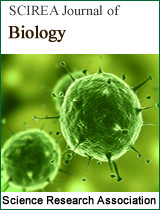COMPARATIVE ANALYSIS OF DYSDERCUS KOENIGII TESTIS PROTEIN (QUANTITATIVE) AFTER THE APPLICATION OF DIFFERENT INSECTICIDES
DOI: 517 Downloads 17881 Views
Author(s)
Abstract
Estimation of total proteins was carried out and compare the effect of different concentrations of insecticides viz, multineem, neemjeevan, imidacloprid, monocrotophos, quinolphos and oxydemeton-o-methyl on the testis of D. koenigii. IV instar nymphs were treated with desired concentrations of different insecticides and the estimation was made at age interval i.e 1-day, 4-day and 7-day old after emergence. The nymphs when transformed into adults then they were dissected and testis was taken out for the estimation purpose. Testes protein of male derived from IV instar was more inhibited by synthetic insecticides than neem products at different age intervals. 0.01, 0.02 and 0.04 percent concentration of multineem did not significantly inhibit the testis protein. In case of oxydemeton-o-methyl the inhibition was significant as compared to control. Quinolphos is the most promising which significantly inhibited the amount of testis protein in 1-day old males whereas in 7-day old it was insignificant.
Keywords
Dysdercus, protein, testis, insecticides
Cite this paper
M. SADRE ALAM FAKHRI, M. SHAFIQ ANSARI,
COMPARATIVE ANALYSIS OF DYSDERCUS KOENIGII TESTIS PROTEIN (QUANTITATIVE) AFTER THE APPLICATION OF DIFFERENT INSECTICIDES
, SCIREA Journal of Biology.
Volume 1, Issue 1, October 2016 | PP. 41-48.
References
| [ 1 ] | Barton-Browne, L., Van Germen, A. C.M. and Williams, K. L. (1979). Oocyte resorption during ovarian development in blowfly, Lucilia cuprina. J. Insect Physiol., 25: 147-153. |
| [ 2 ] | Browns, M. (1986). Expression of the genes coding for vitellogenin (yolk protein). Ann. Rev. Ent., 31: 507-531. |
| [ 3 ] | Chapman, R. F. (1985). The Insects, Structure and Functions. English Language Book Society/Hodder & Stoughton, UK |
| [ 4 ] | Clift, A. D. and MC-Donald, F. J. D. (1976). Some relationship between diet and ovarian development in Lucilia cuprina (Wied.) (Diptera:Calliphoridae). Aus. J. Zool., 24: 87-93. |
| [ 5 ] | Dethier, V. G. (1962). Behavioral aspects of protein ingestion by the blowfly, Phormia regina Meigen. Biol. Bull., 121: 456-470. |
| [ 6 ] | de-Wilde, J. and de-Loof, A. (1973). Reproduction endocrine control. In: “The Physiology of Insecta” 2nd edition (M. Rockstein, ed.) vol. I, pp. 97-158 Academic Press, New York. |
| [ 7 ] | Engelmann, F. (1970). The Physiology of Insect Reproduction, Pergamon, Press, Oxford. |
| [ 8 ] | Friedel, T. and Gillott, C. (1976). Male accessory gland substance of Melanoplus sanguinipes: An oviposition stimulant under control of corpus allatum. J. Insect Physiol., 22: 489-495. |
| [ 9 ] | Gelti-Douka, H., Gingeras, T. R. and Kambysellis, M. P. (1974). Yolk protein in Drosophila. Identification and site of synthesis. J. Exp. Zool., 187: 167-172. |
| [ 10 ] | Goltzene, F. (1977). Contribution a etude de 1’ ovogenese chez Locusta migratoria L. (Orthoptera). Thesis, University of Strasburg. |
| [ 11 ] | Highnan, K. C. and Hill, W. B. (1977). JH induces ovarian development in diapausing cave-dwelling Drosophila species. J. Insect physiol., 20:1779-1786. |
| [ 12 ] | King, R. C., Rubinson, A. C. and Smith, R. F. (1956). Oogenesis in adult Drosophila melanogaster. Growth, 20: 121-157. |
| [ 13 ] | Mitlin, N. and Wiygul, G. (1971). Synthesis of nucleic acid and protein in the boll weevil fed with busulphan. Ann. Ent. Soc. Ameri.,64(4): 822-824. |
| [ 14 ] | Murugan, K., Jahanmohini, P. and Babu, R. (1993). Effect of neem kernel extract and neem oil on nutritive and reproductive physiology of Heliothis armigera Hub. World neem Conference, India, pp. 321-334. |
| [ 15 ] | Orr, C. W. M. (1964a). The influence of nutritional and hormonal factors on the chemistry of the fat body, blood and ovaries of blowfly, Phormia regina Meigen. J. Insect Physiol., 10: 103-119, |
| [ 16 ] | Pickford, R., Ewen, A. B. and Gillott, C. (1969). Male accessory gland substance and egg laying stimulant in Melanoplus sanguinipes (F.) (Orthoptera:Acrididae). Can. J. Zool., 47: 1199-1203. |
| [ 17 ] | Price, G. M. (1973). Protein and nucleic acid metabolism in insect fat body. Biol. Rev., 48: 333-375. |
| [ 18 ] | Spradbery, J. P. and Schweizer, G. (1979). Ingestion of food by the adult screw worm, Chysomya bezzianaI (Diptera:Calliphoridae). Entomol. Exp. Appl., 25: 75-85. |
| [ 19 ] | Srivastava, V. K. and Kumar, K. (1984). Effect of the chemosteriant bisazir on the testis of spotted bollworm, Earias fabiae, Stoll. Toxicology., 31(3-4): 335-342. |
| [ 20 ] | Strangways, Dixon, J. (1961). The relationship between nutrition, hormones and reproduction in the blowfly, Calliphorta erythrocepala. I. Selective feeding in relation to the reproductive cycle, the corpus allatum and fertilization. J. Exp. Biol., 38: 225-235. |
| [ 21 ] | Vogt, W. G. and Walker, J. M. (1987). Potential and realized fecundity in the bush fly, Musca vetustissima under favorable and unfavorable protein feeding regimes. Entomol. Exp. Appl., 44:115-122. |
| [ 22 ] | Zaidi, Z. S. and Khan, M. A. (1981). Effects of dipterex on the total cholesterol and protein levels of the heamolymph, fat body and gonads of Dysdercus cingulatus Fabr. (Hemiptera:Pyrrhocoridae). Zoologischer-Anzeiger., 206:1-2. |

